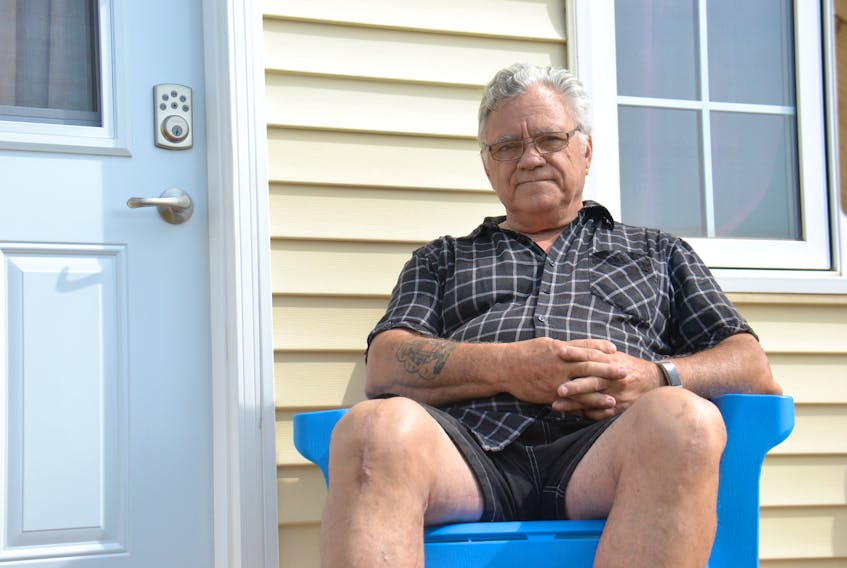ST. LAWRENCE, P.E.I. - Former RCMP officer Rick Marleau has had four knee surgeries – three on his right and one on his left.
He first developed osteoarthritis over time after being involved in a skiing accident as a teenager. This developed to the point where, in 2004, he underwent his first replacement surgery on his right knee.
The St. Lawrence resident said he later found out the surgeon lacked some of the proper components for the prosthesis.
“They didn’t have the right parts when they opened me up,” Marleau said.
“What had happened was the prosthetic was coming loose from the bone. They didn't do pins on that first one."
In 2006, Marleau underwent a revision surgery at the Queen Elizabeth Hospital in Charlottetown. He said this largely corrected the problem, and he was able to get the surgery two months after first contacting his doctor about joint pain.
But earlier this year, he was back in hospital again for a third revision on his right knee.
One of the pins had begun to wiggle inside the bone, causing pain. Marleau was quickly referred to a specialist in Halifax and managed to undergo surgery within six weeks.
“There was a possibility of (a) collapse," he said, explaining the urgency in completing the surgery quickly.
"If that would have happened, then the only option after that would have been to amputate the leg.”
Marleau says his most recent surgery has been a success, his mobility having greatly improved.
“There's a sweet spot. You have to be active, but not that active. You might not want to run a marathon, but you also cannot be a couch potato."
Dr. Andre Celliers
But his experience fits a pattern of a significantly high number of Islanders, according to a study carried out by the Canadian Institute for Health Information (CIHI).
The study found Prince Edward Island residents have a higher rate of revision to primary hip and knee surgeries compared to the rest of Canada. One in six hip surgeries and one in 10 knee surgeries performed in P.E.I. are revisions. Nationally, one in 11 hip surgeries and one in 13 knee surgeries are revisions.
CIHI communications director Marisa Duncan said reducing hip and knee repeat or revision surgeries can improve a patient’s quality of life and reduce health-care costs.
“Because they are a little bit more complex, they do involve a longer recovery time and are a little bit more expensive as well," Duncan said.
“Revision surgeries are on the rise, but they are preventable. There can be improvement done on that as well.”
Nationally, the report said, repeat hip and knee surgeries cost the country’s health-care system $130 million. In 2016-17, there were 65 revision surgeries in P.E.I., which cost more than $890,000 in inpatient spending.
The study also found the Island’s average length of stay in hospital following knee and hip surgeries was the highest in the country. On average, P.E.I. residents stay in hospital 12.7 days after hip surgery and 5.7 days after knee surgery. The Canadian average length of hospital stay was four days for hip surgery and two days for knee surgery.
P.E.I. also has some of the longest wait times for knee and hip replacement surgery compared to other provinces.

André Celliers, Health P.E.I.’s executive director for medical affairs, says the comparatively longer wait and recovery times following these surgeries is partly due to the Island’s aging population.
But the Island’s medical system also has a limited number of orthopaedic surgeons able to perform these surgeries. Celliers said there are currently five orthopaedic surgeons working on the Island, but only three perform knee and hip replacements. Two are focused entirely on other joints, such as feet, elbows and ankles.
Vacancies in other allied professions may also play a role in the Island’s longer recovery times.
“In hospital, they are also reliant on the rehab services and we had a number of vacancies in physiotherapy in the past,” Celliers said.
He said Health P.E.I. has recently increased its focus on home care and pre-operative consultation. He said this education can help improve patient behaviour, encouraging patients to adhere to rehabilitative exercises. This can play a significant role in reducing the need for revision surgery.
“There's a sweet spot. You have to be active, but not that active. You might not want to run a marathon, but you also cannot be a couch potato," Celliers said.
Marleau says he has remained active since his most recent surgery. He is working on renovating a second home.
However, after discussions with his doctor, he says he has not attended regular physiotherapy sessions due to the long travel distance from his home in St. Lawrence, near Miminegash.
“I found it was better to do things normally,” he said.









